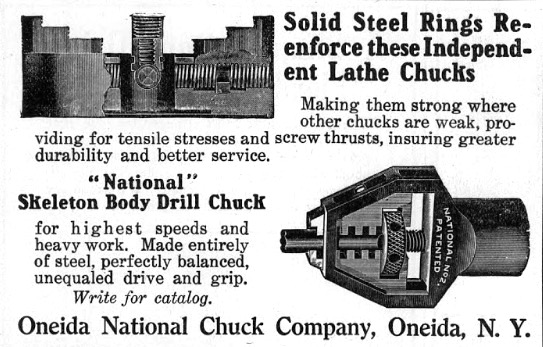The Oneida Manufacturing Chuck Co. of Oneida, NY, was organized in early 1891 to manufacture chucks as well as wagons, sleighs, gears, and metalworking tools. At some point in or before 1899 they acquired another Oneida-based chuck manufacturer, the National Chuck Co., makers of the "National" drill chuck, as seen in the ad below. In 1899 the merged business reorganized as the Oneida National Chuck Company.
Oneida had become a major center of lathe and drill chuck manufacture due to the presence of the Westcott Chuck Co.; that firm not only produced a stream of innovative new chuck designs, they also produced ingenious manufacturing methods that Westcott kept as trade secrets. Not unexpectedly, numerous workers who had worked at Westcott subsequently worked at other chuck manufacturers in Oneida. In particular, the factory superintendent for Oneida National, Emerson Smith, had held a senior position at Westcott and was privy to their manufacturing secrets.
In November 1904 the Westcott Chuck Company sued the Oneida National Chuck Company for confusing the public by introducing, in 1902-03, two lines of chucks identical to Westcott's "Little Giant Double Grip" and "Little Giant Improved" drill chucks, in infringing Westcott's "Double Grip" trademark, and in advertising their clone chucks as identical to those "formerly manufactured by the Westcott Chuck Co.", thus implying that Westcott was no longer making their chucks. Westcott itemized numerous misleading acts by Oneida National, and after hearing the arguments from both sides, the court accepted Westcott's claims almost in their entirety. The court found that Oneida National had "wrongfully and unlawfully reproduced substantial duplicates of the plaintiff's,... being calculated to deceive intending purchasers into believing that the said chucks were the production of the plaintiff concern." A permanent injunction was issued to prevent Oneida National from selling their clone chucks, and damages were assessed. National Oneida appealed to the New York State Supreme Court and lost again: that court reiterated the use of the word "fraudulent", and added the word "wicked", in describing National Oneida's deceptive practices. "An intent to deceive is evident in every act of the defendant."
In 1918 Oneida National was acquired by Pratt Chuck Co.
 |
| Advertisement from August 1912 Machinery |
Information Sources